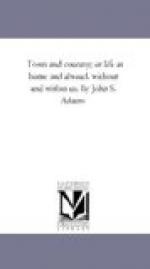In the London Times of January 3d, 1820, is the following, purporting to be a copy of a letter sent to a medical gentleman:
“CER: Yole oblige me uf yole kum un ce me. I hev a Bad kowld, am Hill in my Bow Hills, and hev lost my Happy Tight.”
William Cowper, the poet, being on very familiar terms with the Rev. Mr. Newton, amused himself and his friend with a letter, of which the following is a copy:
“My very dear friend: I am going to send, what, when you have read, you may scratch your head, and say, I suppose, there’s nobody knows, whether what I have got be verse or not; by the tune and the time, it ought to be rhyme; but if it be, did you ever see, of late or of yore, such a ditty before?
“I have writ Charity, not for popularity, but as well as I could, in hopes to do good; and if the reviewers should say, ’To be sure the gentleman’s muse wears methodist shoes, you may know by her pace, and talk about grace, that she and her bard have little regard for the taste and fashions, and ruling passions, and hoydening play, of the modern day; and though she assume a borrowed plume, and now and then wear a tittering air, ’t is only her plan to catch, if she can, the giddy and gay, as they go that way, by a production on a new construction; she has baited her trap, in hopes to snap all that may come, with a sugar-plum.’ His opinion in this will not be amiss; ’t is what I intend my principal end; and if I succeed, and folks should read, till a few are brought to a serious thought, I shall think I am paid for all I have said, and all I have done, though I have run, many a time, after rhyme, as far as from hence, to the end of my sense, and, by hook or crook, write another book, if I live and am here, another year.
“I heard before of a room, with a floor laid upon springs, and such like things, with so much art, in every part, that when you went in, you was forced to begin a minuet pace, with an air and a grace, swimming about, now in and now out, with a deal of state, in a figure of eight, without pipe or string, or any such thing; and now I have writ, in a rhyming fit, what will make you dance, and, as you advance, will keep you still, though against your will, dancing away, alert and gay, till you come to an end of what I have penned; which that you may do ere madam and you are quite worn out with jigging about, I take my leave; and here you receive a bow profound, down to the ground, from your humble me,
“W. C.”
At one of those famous coteries, so fashionable in the time of George Selwyn, Selwyn declared that a lady never closed a letter without a postscript. One of his fair auditors defended her sex by saying that her next letter should prove he was wrong. Soon after, Selwyn received a letter from the lady, in which, after the name, was “P. S. Who is right now, you or I?”
“We have met the enemy, and they are ours” is an example for naval letters. Commodore Walton’s letter, by which he gave information of his capture of a number of Spanish vessels of war, was as follows:




